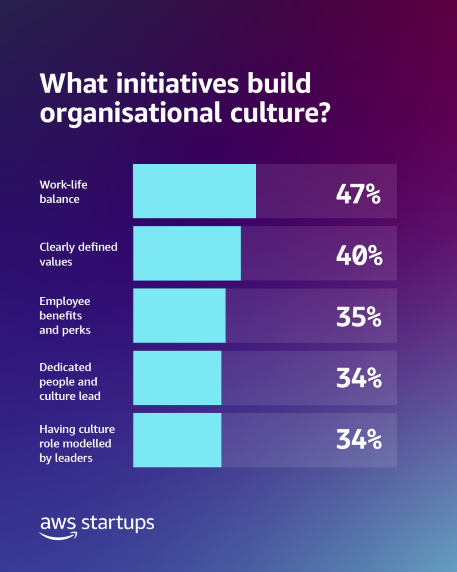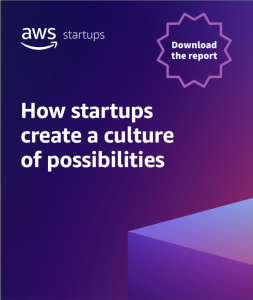How was this content?
Why culture is critical to startup organizational growth
Startups are in the business of proving what’s possible and bringing world-changing ideas to life. But founders can’t do it all on their own. To achieve their goals, they must build strong teams they can trust to implement their vision. And they need to cultivate a strong workplace culture that encourages experimentation, quick decision making, and learning from mistakes.
Indeed, new research commissioned by AWS shows that workplace culture is vital to a startup’s success. Six out of seven startup leaders (86%) believe a company’s culture contributes to its growth, with 85% saying it can play a critical role in securing investment and the same number saying it is an important factor in attracting new talent.
To build a strong workplace culture, leaders must do more than offer “traditional” startup perks like ping-pong tables, kombucha kegs, and paid lunches. Craig Cowdrey, co-founder and CEO of the workplace wellbeing startup Sonder, says today’s workers have become skeptical of these basic benefits. “So much of these [traditional perks] have been recognized as not particularly relevant or determinative in an employee’s choice,” he says. “A lot of them think that it’s just to keep them working in the office longer.”

Instead, the research indicates that startups should prioritize work-life balance initiatives in order to attract talent and get the most out of their teams. Startups can often be chaotic, high-pressure environments, but founders must work to protect both themselves and their teams from the “grind culture” of overwork and burnout that is so prevalent in the startup ecosystem.
Dismantling that culture of constant work and pressure will not happen overnight — 93% of startup leaders we surveyed acknowledge that grind culture currently exists in the startup landscape. But a growing number of leaders recognize that logging long hours in the pursuit of perfection or to fend off the competition isn’t a recipe for success in the long term.
“Pulling 60- or 70- or 80-hour work weeks isn’t a badge of honor — it’s stupid, and you can’t keep doing that,” says Megan Woff, head of founders at Startmate Accelerator.
Instead, developing a workplace culture that emphasizes self-care is key to a startup’s growth and long-term viability. Dr. Ben Hurst, founder and CEO of the patient engagement platform HotDoc, says that as his company has evolved, they have worked to minimize the grind and embrace wellbeing as a priority. “You are doing the wrong thing if you are working in a way that is not self-sustaining,” he says.

Hurst’s way of thinking is likely to have ripple effects across the business landscape, working to create healthier workplaces and putting companies of all sizes on the path to success. 71% startup leaders say the larger corporate world watches the startup landscape very closely. And one-third of startup leaders believe that by disrupting older, outmoded ways of working, startups are having a positive impact on the wider business culture.
AWS is proud to support startup founders on their journeys, helping them to solve the world’s problems through the power of technology. The AWS Activate program provides qualified startups with a host of benefits, including AWS credits, technical support, and training.
Check out the rest of the research and insights in the report, “How startups create a culture of possibilities,” to learn from established founders about what it takes to create a culture for success and the key factors and considerations that have made the difference as they’ve grown.

Hannah Wall
Hannah Wall is the Head of Startups Content Marketing. She has 15+ years of experience leading top-performing, large-scale campaigns that drive customer engagement. As a customer-obsessed marketer and behavioral scientist, she’s dedicated to strategic, supportive, and effective communication that creates meaningful dialogue between companies and their customers, and driven to create simple user experiences that drive revenue and reduce customer contacts.
How was this content?